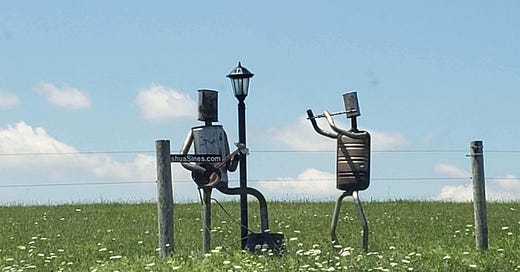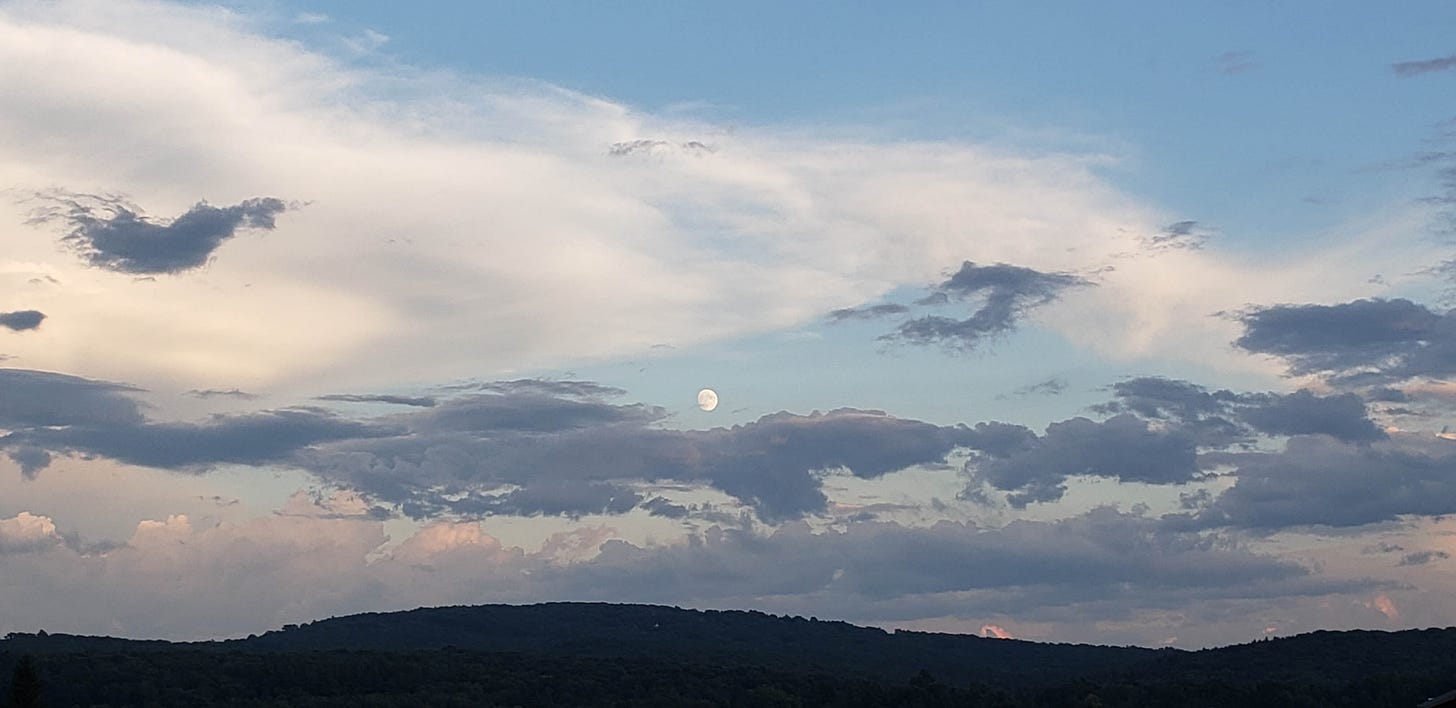"Six Things" Practice for Writer's Block/Paralysis
How to be creative without pressure, apocalyptic movie recs & my mountain retreat from writing.
Hey there Real Writers,
Part of the goal of this newsletter is to write when I have something to say. When I feel like it. Not forcing myself to churn out weekly content to engage you enough to subscribe someday, at my own expense—or yours—without my earning it.
(Blah blah consistency blah blah data blah blah SEO.)
Someday, that would be great, because I want people looking for their own writing rhythm with all its thrills, messiness, and yeah, sometimes, hopelessness, to find a home here. And I’d love to make a living by sharing what I know and helping other writers.
And, there are too many people out there selling programs that promise to get you published, banking on the collective panic that we will die unknown and unread.
If you end up unknown and unread, so what?
Stop for a second and look this fear in the face. Take some deep breaths. Make your peace with it. There is a lot in the writing and publishing world you can’t control.
Then, stash your manuscripts (hard copy) in a box under your bed for some lucky descendant to find after you die and I’ll meet you at the Restaurant at the End of the Universe where Poe, Kafka, Keats, Austen, and Hurston are hanging out.
I’m not putting us in their class, just making a point that many great writers were super famous after they were dead. Not as much fun, of course, but if you take the idea to its final (really final) conclusion, it will lose its power over you.
Back to me! As with any new relationship, I jumped right into this newsletter and initially gave it my all, but eventually the laundry needs to be done and the late nights at work just keep coming and free time becomes about recovery not relaxation.
Where does that leave creativity?
Hahahahaha!
I have been doing a lot of manuscript editing with some return clients and some new ones, which I am totally counting in my favor.
The point is: how can we all still be creative during barren or blocked times?
When the well is dry, experiences and discoveries become your creativity. Here’s what that looks like:
Write six things you have seen, heard, touched, smelled, tasted, and felt each day.
That’s it. Thanks for reading!
I’m kind of not kidding. That really is it. The trick is not to make the items in your list anything other than what they are. No figurative language. No metaphors, similes, hyperbole, symbols. No judgments. No going back to cross something off and add a different thing because it’s “better.” That’s cheating.
Don’t curate the list to make it pretty or meaningful or sacred.
Each day write a short clear list. One thing for each sense, including feeling. That is all. Once you have the six things you’re off the hook. Some days you may struggle to write something you smelled or heard. Just double up on one of the others. Or you are having so many emotions, you can’t pick one. But do—pick one.
Part of this exercise is developing one’s observation skills and being in the present moment. Choosing to pay attention without pressure to perform. Letting your six things be. It’s not about writing something down with the goal of making it something else or sketch out what you’ll write from it later.
As you progress in this practice, see if you get an intuitive hit, a special recognition, of what belongs on your list. Trust and attune to this feeling.
Here is my list from today:
Walking barefoot in the grass and stepping on geese shit EVERYWHERE.
Rain pummeling the pond and driving the geese away.
Salted caramel ice cream from a little yellow shop by the train tracks.
Waking to a scream in the early hours of the morning. (Dream? Me? Ghost? Who knows? I was the only one in the inn last night….)
Lemon-scented bar of hand soap in my room.
Delight (yes, delight!) at spotting this window display in a nearby town:
Things like the above pic await you!
If you can only muster the energy to write one thing then do that once a day and on the seventh you can rest.
This is also a form of “averted vision.”
Averted vision is a way to look at faint objects (like stars) using peripheral vision—you don’t actually look at the thing you’re trying to see.
With this Six Things practice, you don’t focus on writing. And the less you focus on it and relax, tuning into your environment, the less pressure, frustration, and confusion you’ll feel about your writing and the more you will see and receive.
Instead, you’re simply being open to the six surprises that will reveal themselves to you each day and noting them on your list. The bonus is, this exercising of your intuition will allow all kinds of unexpected ideas to surface that you won’t repress/ignore/judge because they don’t “fit.”
Soon enough, the well will be full again.
This brings me to the ending of The Seventh Sign (1988) with Demi Moore. If you haven’t seen that movie (“apocalyptic drama horror” is the genre - isn’t that great?) it’s a good one, but you can also just read the synopsis.
SPOILER ALERT: I’m going to give away the ending here. The reason the “Hall of Souls is full” at the end of the film, is because Demi’s pregnant character finally gives birth and the baby’s heart stops beating. This is the final sign, the “soulless child” and she agrees to die for him. Her soul is transferred to him and this selfless loving act fills the “Hall of Souls.”
I always heard “the Hall of Souls is full again” as “the well of souls is full again.” Isn’t that just better? It is to me because of the connection between filling the well as writers and the well of souls, a connection I made instantly when I watched that movie back in the day. In a theater (always the better choice).
As writers, we are deep diving into the depths of the unknown, the unconscious, the undiscovered to find what is ours. The souls of books, poems, stories, essays, songs, plays, films, that we nurture within us and give birth to. We each have our own well and we each fill it differently. And when it’s not full, it can feel apocalyptic, like the world is ending and you’ll never write again.
(If you watch the movie, watch The Rapture (1991) afterward with Mimi Rogers (first wife of Tom Cruise, before Nicole Kidman. It’s an incredible performance) and David Duchovny from X-Files and Californication. He’s a novelist now). Totally different but also good. There’s your next Sunday afternoon sorted.)
New Word Sidebar: Mondegreen
My mishearing the “Hall of Souls” for “well of souls” is an example of mondegreen, hearing something incorrectly (song lyric, movie dialogue, etc.) and substituting something that makes sense, but changes the meaning. Mondegreen is a word created by the American writer Sylvia Wright in 1954 and has been added to the dictionaries.
Why should we care, Chris?
Because you better love words as a writer and the discovery of them should make your heart beat faster. If it doesn’t, you’ve found this newsletter just in time!
And because I’m going to create my own phrase in a minute. Get ready.
Pay attention to where and when this happens in your writing. You mean one thing but write another because you choose the word that sounds like the word you meant but isn’t. Or you write something down differently than you heard it, etc. These are not mistakes!
Your writing mind is saying go this way. Look here. Try this.
And now, the new phrase: I’m calling this AVERTED WRITING. You may be aiming for that star, but the real sign is off to the side. It’s the comet or the asteroid you may not have seen if you hadn’t averted your gaze. The one that’s going somewhere. Catch that ride!
EXERCISE:
After two weeks or a month of making your lists, read them over and highlight the ones that correlate—that have similarities, echoes, contradictions, or somehow develop each other (magic!).
Make a separate list of these.
Is there a spark there you can kindle and try writing something with them? Give it a try—a poem, a bit of flash fiction, a fictional travel essay to another world, a song.
Your Six Things is your sensory details bank. Keep a notebook just for this exercise or put them in a spreadsheet (sorry—spreadsheets are not exciting but you can search them….) or some other program you can track.
The Six Things practice is a variation on an exercise in the wonderful essay called The Art of Finding by the poet Linda Gregg if you’d like to read it.
Here are some pics from this beautiful place in Western Maryland where I am on retreat from writing and filling the well, including a heavy rainstorm I enjoyed on the porch. Practice your Six Things through these to start.
And remember: whatever your practice is, it’s perfect.
Time for Writing Adventure #4 in the next post.
Happy averted writing!
Chris
See you in writing adventure #4…
Here’s some rainy day magic for you:













